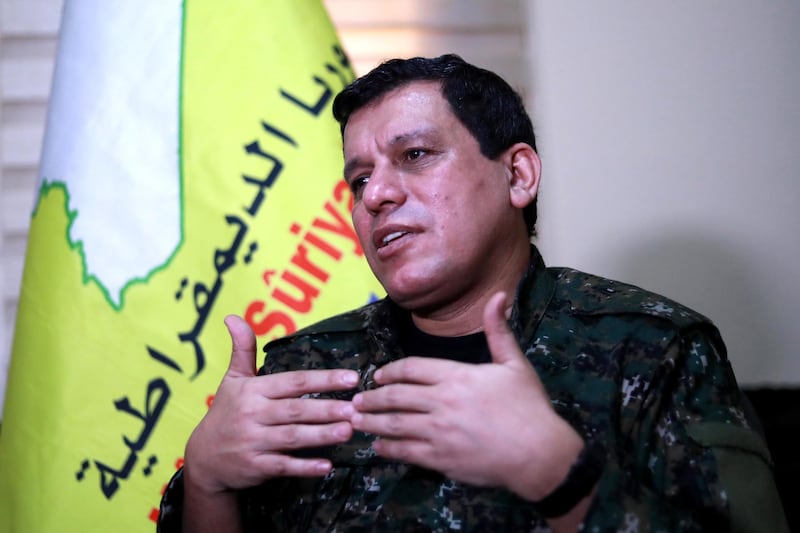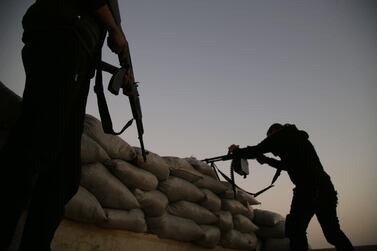Military operations against ISIS in Syria are wrapping up and the last pocket of the group's "caliphate" will be flushed out within a month, according to the commander of the US-backed forces fighting the extremist militants.
"The operation of our forces against IS in its last pocket has reached its end and IS fighters are now surrounded in one area," said Mazloum Kobani, chief of the Kurdish-led Syrian Democratic Forces, referring to the group by an alternative acronym.
With backing from the US-led coalition against ISIS, the SDF are in the last phase of an operation started on September 10 to defeat the extremists in the Euphrates Valley in eastern Syria.
"We need a month to eliminate IS remnants still in the area," said Mr Kobani, who spoke to AFP on Thursday near the north-eastern Syrian city of Hassakeh.
A few hundred ISIS fighters are defending a handful of hamlets near the Iraqi border, the last rump of a "caliphate" which the group proclaimed in territory straddling Syria and Iraq in 2014.
"I believe that during the next month we will officially announce the end of the military presence on the ground of the so-called caliphate," Mr Kobani said.
Intense fighting in the area known as "the Hajin pocket" has left hundreds of fighters dead on both sides, according to the Syrian Observatory for Human Rights, a Britain-based war monitor that relies on information from sources inside Syria.
ISIS lost the town of Hajin late last year and the subsequent collapse of its defences saw the Kurdish-led SDF conquer one village after another.
Mr Kobani said their battle had been complicated by the group's shifting strategy after the fall of their de-facto Syrian capital of Raqqa in 2017.
New tactics include "sleeper cells everywhere, secretly recruiting people again, and carrying out suicide operations, bombings, and assassinations", he said.
"We expect there will be an increase in the intensity of IS operations against our forces after the end of their military presence," Mr Kobani said.
ISIS has retained a presence in Syria's vast Badia desert and has claimed a series of attacks in SDF-held territory.
The SDF, which is dominated by the Syrian Kurdish YPG militia, controls around a third of Syria after expelling ISIS from the north-east of the country with backing from the US-led coalition. The group now faces the threat of an offensive from Turkey, which considers the YPG a terrorist group aligned with the Kurdistan Workers' Party that has waged an insurgency against Ankara for decades.
US President Donald Trump's announcement last month that he planned to withdraw an estimated 2,000 American troops supporting the SDF has emboldened Turkey and prompted the Syrian Kurds to seek an understanding with Syrian President Bashar Al Assad's government.
However, any deal between Syria's Kurds and Damascus should give "special status" to the Kurdish-led forces, Mr Kobani said.
"Any political agreement should include the special status" of the SDF after they fought ISIS "on behalf of all humanity and even the Syrian army", he said.
"This is our red line and we will not concede this" in ongoing talks with the Damascus regime, he said.
The SDF "protected north-eastern Syria … liberated these areas, and have the right to continue protecting the region", Mr Kobani said.
Mr Al Assad controls most of the remaining areas of Syria, apart from the rebel-held north-western province of Idlib, after his ally Russia intervened militarily in 2015 to help quell an uprising against his rule.
His government is determined to now reassert its authority over SDF-held areas.
But after years of marginalisation, Syria's Kurds are determined to keep some of the autonomy they gained during the eight-year civil war.
The SDF could "agree to be part of the national army of a future Syria, but only on the condition they keep their special status", Mr Kobani said.
Damascus has rejected self-rule in north-eastern Syria, but Kurdish leaders started talks with the government in July in a bid to seek some form of decentralisation.
"The discussions are ongoing but have not yet reached any positive result," Mr Kobani said.
The regime "keeps on thinking it can go back to the way it was before 2011. It still hopes it can take military control of the whole region", he said.
"It needs to understand that is impossible."
Mr Kobani said the SDF was prepared to "protect the Syrian border and the unity of Syrian territory" and would "accept the results of centralised elections if they occurred".






